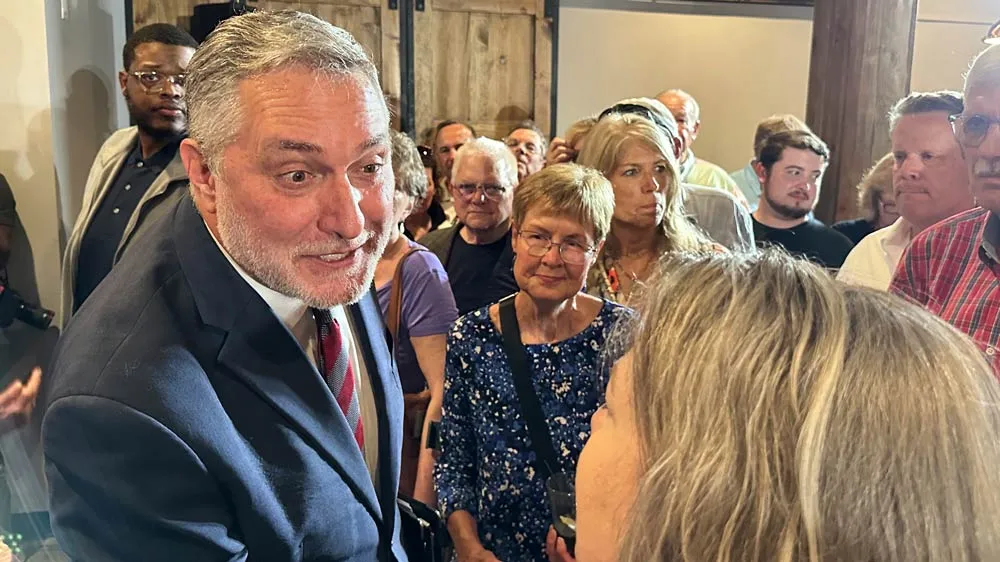July 14, 2010
AIDS Group Gets New Headquarters - But Larry Kramer Objects
Kilian Melloy READ TIME: 4 MIN.
The longest-running AIDS service organization in the country is relocating to a larger space, at 450 West 33rd Street in Manhattan. But a few critics--especially one of the group's founders--are voicing their objections to the move.
Gay Men's Health Crisis (GMHC) was co-founded in 1981 by novelist and playwright Larry Kramer and a group of others in Kramer's apartment. In 1983, Kramer, who remains a longtime AIDS activist, left GMHC and started ACT UP, going on to write a play about his experiences with GMHC, The Normal Heart.
GMHC was started as a response to the AIDS epidemic, and has remained at New York City's forefront of the battle against the disease, as well as the fight to care for--and preserve the dignity of--people living with HIV/AIDS. Among other services GMHC has provided are counseling, housing assistance, medical services, and hot meals. GMHC remains as reportedly the largest such private AIDS service organization in the world.
Some fear that the group's move could mean a decline in some of those services, especially the medical aspect. Though the organization's new address will be more spacious--and has recently undergone a $4 million upgrade--no medical services will be allowed on the premises. That, and the fact that clients of the GMHC will be required to enter the building through a separate door, doesn't sit will with the 75-year-old Kramer, a July 13 New York Times article said. The article noted that Kramer demanded the resignation of GMHC executive director Marjorie Hill for "putting the interests of the landlord ahead of those of the organization's clients," as the Times put it.
The move was inevitable. GMHC has a 15-year lease on the Manhattan property, located at 119 West 24th Street, but that lease is due to expire on Dec. 31. The current landlord plans to raise the rent on the space from $6 million to $8 million per year. That's too steep a jump for the service organization.
But landlords are not necessarily eager to have service organizations operating in their buildings, let alone groups that tend to the needs of people living with HIV / AIDS, reported a June 23 article at news site NY1.com.
"Many of the buildings we went to, about 20 to 25, basically said they didn't want a kitchen, that they didn't want medical, that they really didn't want a social service entity in their office at all," Hill told the news site.
The site noted that HIV testing would not take place at the new location. Moreover, a research lab and clinic associated with the group would not set up in the new space. "We are talking about a part of Manhattan that has the highest incidence rate of HIV indeed anywhere in the country," pointed out Dr. Jonathan Jacobs, who is with the group that runs the clinic, NewYork-Presbyterian/Weill Cornell Medical Center. Jacobs went on to add that, "now our clinic, which serves 1,300 people, [will be] looking for a new home."
A July 14 news release from GMHC promoted the move with optimistic language, saying that more space meant greater service for the organization's clientele and quoting from officials with other AIDS and GLBT organizations who wished GMHC well on its new address. "With the move to the new home, GMHC will be able to continue to meet the complex and growing needs of people affected by HIV/AIDS," the release said.
"I am relieved and excited that we can now proceed with the move to our new home," Hill remarked in the release. "The new spaces will allow us to spend less on occupancy costs then we would by staying on 24th Street and more on our daily operations in an HIV/AIDS crisis that is far from over."
But even proponents of the new space admitted that its location is less than idea, the New York Times reported: it's further from subway stops, for one thing. That means a longer walk for those who rely on public transportation, which could be a daunting prospect in inclement weather; as GMHC volunteer Marcelo Maia put it, "We're not talking about healthy people. We're talking about people with compromised immune systems." Moreover, Kramer pointed out that the area currently has a lot of construction going on, which he called "a public health hazard" with which people living with HIV or AIDS would have to contend "every day" if they kept using the GMHC's services.
Kramer had called for the group to stay put while it sought a more suitable location, but Hill rejoined that the new rent would simply be too costly, diverting money away from services to pay for the hike in rent. The news release reiterated that point: "If GMHC had renewed the current lease, its average annual occupancy expense would have increased by at least 33%," the release stated. "As a non-profit organization, all of the cost savings gained by moving will stay with GMHC and be used to enhance vital services and programming."
Kilian Melloy serves as EDGE Media Network's Associate Arts Editor and Staff Contributor. His professional memberships include the National Lesbian & Gay Journalists Association, the Boston Online Film Critics Association, The Gay and Lesbian Entertainment Critics Association, and the Boston Theater Critics Association's Elliot Norton Awards Committee.






